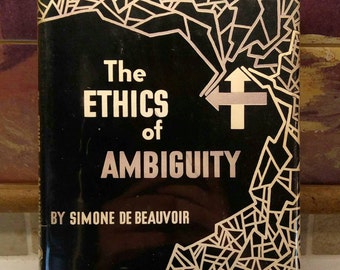

It is necessarily summoned up by the values which it sets up and through which it sets itself.To will oneself moral and to will oneself free are one and the same decision.

It is not a ready-made value which offers itself from outside to my abstract adherence, but it appears (not on the plane of facility, but on the moral plane) as a cause of itself.

At the same time that it requires the realization of concrete ends, of particular projects, it requires itself universally. In addition to The Second Sex, her bestknown work, and The Ethics of Ambiguity, she wrote five novels. Yet the present is still a moment of choice and action. Many take this aesthetic attitude during moments of confusion and despair. The man who seeks to justify his life must want freedom absolutely and above everything else. The Cambridge Companion to Simone de Beauvoir. Beauvoir calls this attitude aesthetic because those who adopt it claim to only approach the world through detached contemplation. It is the original condition of all justification of existence. Christian ethics dispenses salvation to the individual as the Ethics of Ambiguity depends on the individual accepting the nature of their ambiguity. Christian salvation is provided by an individual source as are the Ethics of Ambiguity. "Freedom is the source from which all significations and all values spring. Both Christian ethics and the Ethics of Ambiguity depend upon individual devotion. I'm still not great at reading philosophical texts and actually comprehending them, I'm also trying to get ready for the exam which may be on this book so I also just want to understand it better so I can actually get a good grade! In The Ethics of Ambiguity, she developed an. Hey! Just wondering if anyone can help be better understand and explain this quote? I started reading the book for school and find it very insightful but have trouble understanding some of it. Simone de Beauvoirs view on existential morality incorporates various political and ethical dimensions.


 0 kommentar(er)
0 kommentar(er)
